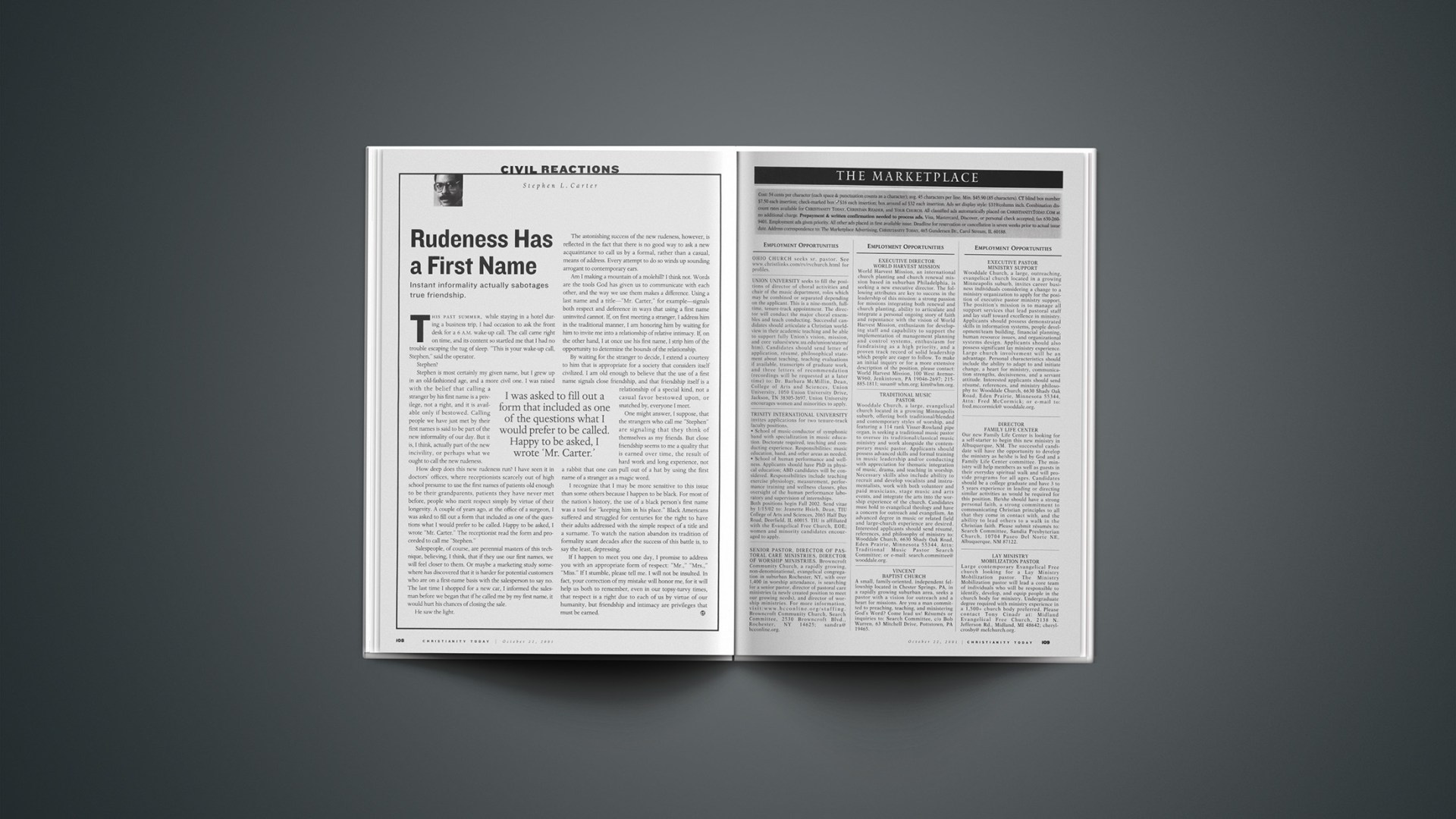This past summer, while staying in a hotel during a business trip, I had occasion to ask the front desk for a 6 A.M. wake-up call. The call came right on time, and its content so startled me that I had no trouble escaping the tug of sleep. “This is your wake-up call, Stephen,” said the operator.
Stephen?
Stephen is most certainly my given name, but I grew up in an old-fashioned age, and a more civil one. I was raised with the belief that calling a stranger by his first name is a privilege, not a right, and it is available only if bestowed. Calling people we have just met by their first names is said to be part of the new informality of our day. But it is, I think, actually part of the new incivility, or perhaps what we ought to call the new rudeness.
How deep does this new rudeness run? I have seen it in doctors’ offices, where receptionists scarcely out of high school presume to use the first names of patients old enough to be their grandparents, patients they have never met before, people who merit respect simply by virtue of their longevity. A couple of years ago, at the office of a surgeon, I was asked to fill out a form that included as one of the questions what I would prefer to be called. Happy to be asked, I wrote “Mr. Carter.” The receptionist read the form and proceeded to call me “Stephen.”
Salespeople, of course, are perennial masters of this technique, believing, I think, that if they use our first names, we will feel closer to them. Or maybe a marketing study somewhere has discovered that it is harder for potential customers who are on a first-name basis with the salesperson to say no. The last time I shopped for a new car, I informed the salesman before we began that if he called me by my first name, it would hurt his chances of closing the sale.
He saw the light.
The astonishing success of the new rudeness, however, is reflected in the fact that there is no good way to ask a new acquaintance to call us by a formal, rather than a casual, means of address. Every attempt to do so winds up sounding arrogant to contemporary ears.
Am I making a mountain of a molehill? I think not. Words are the tools God has given us to communicate with each other, and the way we use them makes a difference. Using a last name and a title—”Mr. Carter,” for example—signals both respect and deference in ways that using a first name uninvited cannot. If, on first meeting a stranger, I address him in the traditional manner, I am honoring him by waiting for him to invite me into a relationship of relative intimacy. If, on the other hand, I at once use his first name, I strip him of the opportunity to determine the bounds of the relationship.
By waiting for the stranger to decide, I extend a courtesy to him that is appropriate for a society that considers itself civilized. I am old enough to believe that the use of a first name signals close friendship, and that friendship itself is a relationship of a special kind, not a casual favor bestowed upon, or snatched by, everyone I meet.
One might answer, I suppose, that the strangers who call me “Stephen” are signaling that they think of themselves as my friends. But close friendship seems to me a quality that is earned over time, the result of hard work and long experience, not a rabbit that one can pull out of a hat by using the first name of a stranger as a magic word.
I recognize that I may be more sensitive to this issue than some others because I happen to be black. For most of the nation’s history, the use of a black person’s first name was a tool for “keeping him in his place.” Black Americans suffered and struggled for centuries for the right to have their adults addressed with the simple respect of a title and a surname. To watch the nation abandon its tradition of formality scant decades after the success of this battle is, to say the least, depressing.
If I happen to meet you one day, I promise to address you with an appropriate form of respect: “Mr.,” “Mrs.,” “Miss.” If I stumble, please tell me. I will not be insulted. In fact, your correction of my mistake will honor me, for it will help us both to remember, even in our topsy-turvy times, that respect is a right due to each of us by virtue of our humanity, but friendship and intimacy are privileges that must be earned.
Copyright © 2001 Christianity Today. Click for reprint information.
Related Elsewhere:
Recent Christianity Today columns by Stephen L. Carter include:
Why Rules Rule | Debates on the Ten Commandments expose our culture’s ultimate rift. (posted 9/6/01)We Interrupt This Childhood | Parents who raise their children to do right face a barrage of resistance. (July 11, 2001)And the Word Turned Secular | Christians should count the cost of the state’s affirmation. (May 29, 2001)Vouching for Parents | Vouchers are not an attack on public schools but a vote of trust in families. (Apr. 2, 2001)The Courage to Lose | In elections, and in life, there is something more important than winning. (Feb. 6, 2001)










